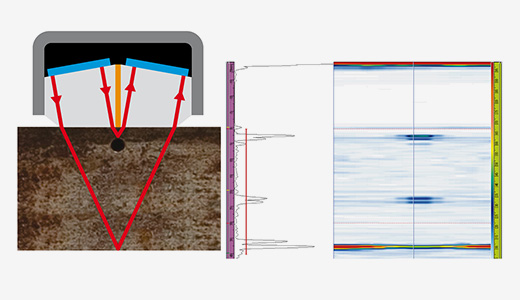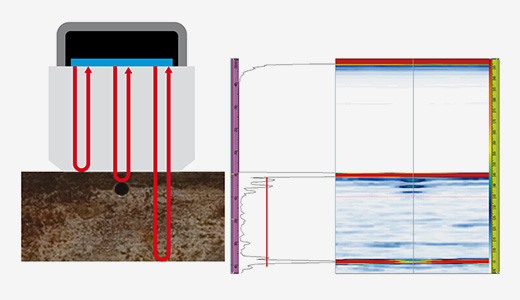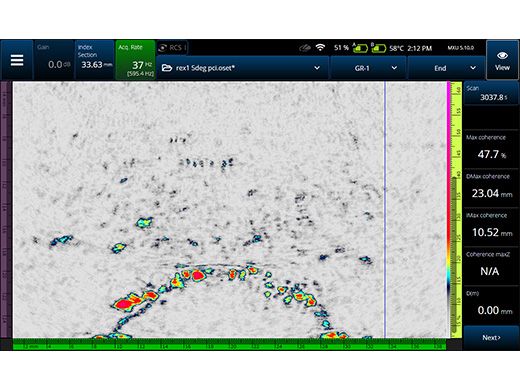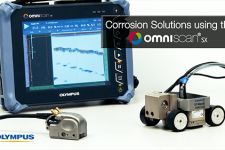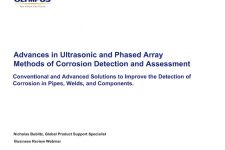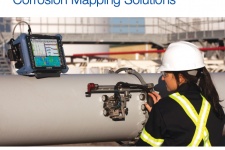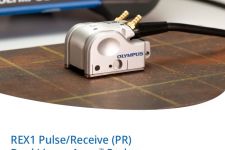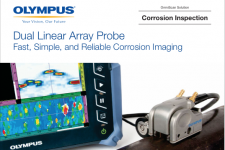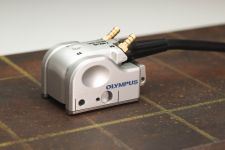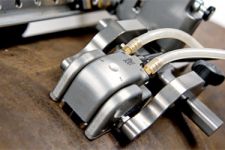Overview
Thickness and Flaw Inspection SolutionsPulse/Receive (PR) Dual Array for Advanced Corrosion InspectionSupporting the advanced capabilities of the latest phased array (PA) inspection technology, our Pulse-Receive (PR) REX1 and REX2 Dual Linear Array™ (DLA) probes feature complex wiring that optimizes its beam firing capabilities. Our PR DLA models enable you to implement more advanced PA inspections, even when you’re using phased array acquisition instruments without pulser/receiver modules. In addition to standard PA imaging, REX1 and REX2 DLA PR probes can be used to perform efficient, high-quality total focusing method (TFM) and phase coherence imaging (PCI) scans. | 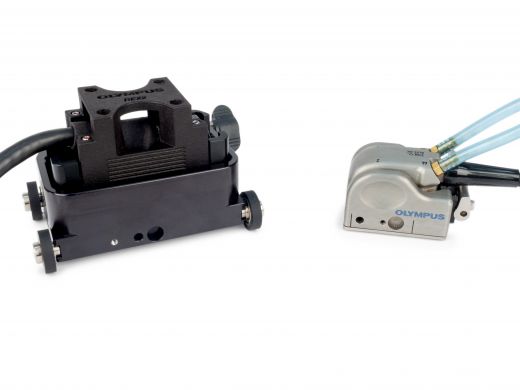 |
Advantages and Features
|
Dual Array Pitch-Catch TechniqueLike dual-element UT probes, DLA probes incorporate separate transmitting and receiving elements mounted on delay lines that are cut at an angle. This configuration generates beams that focus beneath the surface of the test piece, considerably decreasing the amplitude of surface reflections. This results in increased near-surface resolution, providing higher probability of detection (POD) of critical defects such as pitting, creep damage, and HIC (hydrogen induced cracking). |
Pitch-Catch
| Pulse-Echo
|
Compared to phased array pulse-echo, the pitch-catch technique produces very little interface echo, offering better near-surface resolution. | |
|
New Features, New PossibilitiesNewer advanced ultrasonic techniques such as the total focusing method (TFM) and phase coherence imaging (PCI) involve complicated firing sequences that are beyond the firing capacity of standard dual linear probes1. Our REX1 DLA PR model is optimized to support the complex focal law demands of OmniScan™ X3 units with TFM and OmniScan X4 and X3 64 flaw detectors with PCI and TFM. As well as high-quality PA imaging, the REX1 DLA PR probe enables efficient TFM and PCI scanning, as shown in these examples of data acquired of hydrogen induced corrosion (HIC) in steel. |
|
|
1 Legacy non-PR REX1 and ULT1 versions of our DLA probes are still available upon request. These legacy DLA probes are wired odd/even (1-2,3-4, etc.) and are most compatible with instruments without a pulser/receiver module or integrated pulser/receiver capability (e.g., the OmniScan MX2). While these probes are currently available in the OmniScan X3 scan plan’s probe library, the non-PR versions cannot be used in an advanced scan plan, for TFM or PCI, etc. For maximum compatibility, the OmniScan X3 series is preconfigured with the specifications of our DLA probes, making the inspection setup quick and easy. When creating a TFM or PCI scan plan, simply choose your DLA model from the probe list and proceed with focal law configuration directly on the instrument. Learn more about the capabilities of DLA probes, the OmniScan X3 series, TFM, and PCI. |
Specifications
Probe Specifications and Dimensions
| 7.5DL32-32X5-REX1-P-2.5-OM-IHC-PR-RW | 7.5DL32-32X5-REX1-P-5-OM-IHC-PR-RW | ||
|---|---|---|---|
| Item Number | Q3301867 | Q3302172 | |
| Frequency (MHz) | 7.5 | 7.5 | |
| Number of Elements | Dual 32 | Dual 32 | |
| Pitch (mm) | 1 | 1 | |
| Active Aperture (mm) | 32 | 32 | |
| Elevation (mm) | 5 | 5 | |
| Cable Length (m) | 2.5 | 5 | |
| External Dimensions mm (in.) | L | 66 (2.57) | 66 (2.57) |
| W | 40 (1.58) | 40 (1.58) | |
| H | 44 (1.73) | 44 (1.73) | |
| 7.5DL32-REX1 | 10DL64-REX1 | 7.5DL32-REX2 | 7.5DL64-REX2 | |
| Frequency (MHz) | 7.5 | 10 | 7.5 | 7.5 |
| Number of Elements | Dual 32 | Dual 64 | Dual 32 | Dual 64 |
| Pitch (mm) | 1 | 0.5 | 2 | 1 |
| Active Aperture (mm) | 32 | 32 | 64 | 64 |
| Elevation (mm) | 5 | 5 | 5 | 5 |
| *Stabilization System | Carbide | Carbide | Wheels | Wheels |
| Instrument Requirements | 32:128 and up | 64:128 | 32:128 and up | 64:128 |
| Typical Application | Corrosion | HTHA | Corrosion | Corrosion |
Available in two roof angle options: 5 deg. (standard) or 1 deg.
*The carbide system is included with the REX1. The REX2 requires the use of the HydroFORM scanner or a small carriage.
Resources
WebinarsBrochuresSolutions |


